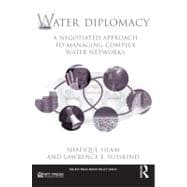
Note: Supplemental materials are not guaranteed with Rental or Used book purchases.
Purchase Benefits
What is included with this book?
| List of Contributors | p. x |
| Preface | p. xii |
| Acknowledgements | p. xv |
| List of Acronyms | p. xviii |
| A Water Management Fable for All Time (with Maia Majumder) | p. 1 |
| Challenging the Conventional Wisdom about Water Management | p. 4 |
| The Evolution of Water Resources Management | p. 4 |
| Integrated Water Resources Management (IWRM) | p. 6 |
| Reflections on Some Unsettled Problems of Planning in Managing Common Pool Resources | p. 7 |
| Water Problems are Complex | p. 8 |
| Water is a Flexible Resource | p. 10 |
| Thinking in Terms of Water Networks Rather than Systems | p. 10 |
| Acknowledging the Complexity of Water Networks | p. 12 |
| A Synthesis of Natural, Societal, and Political Domains | p. 13 |
| Water Diplomacy Framework: Three Propositions | p. 14 |
| Selected Readings with Commentaries | p. 18 |
| References | p. 37 |
| Understanding and Characterizing Complex Water Management Problems | p. 41 |
| The Properties of Complex Systems and Water Networks | p. 42 |
| Domains, Scales, and Levels | p. 46 |
| Watersheds are Disconnected from Problem-sheds and Policy-sheds | p. 51 |
| Selected Readings with Commentaries | p. 53 |
| References | p. 84 |
| Addressing Complex Water Management Problems | p. 89 |
| From Certainty and Consensus to Uncertainty and Disagreement | p. 89 |
| Identifying Issues that Fall into the Zone of Complexity | p. 91 |
| Implementation in the Zone of Complexity | p. 94 |
| Adaptive Learning: A Key to Handling Evolving Complex Water Management Problems | p. 97 |
| Selected Readings with Commentaries | p. 98 |
| References | p. 121 |
| A Non-Zero-Sum Approach to Water Negotiations (with Peter Kamminga and Paola Cecchi-Dimeglio) | p. 128 |
| From Competition to Value Creation | p. 131 |
| Mediating Conflicting Claims | p. 133 |
| The Dangers of Zero-Sum Thinking | p. 134 |
| An Alternative Problem-Solving Approach | p. 137 |
| A Non-Zero-Sum Approach | p. 138 |
| Convening Problem-Solving Forums | p. 139 |
| Important Lessons | p. 150 |
| Selected Readings with Commentaries | p. 150 |
| References | p. 189 |
| The Practice of Water Diplomacy in a Nutshell (with Elizabeth Fierman) | p. 197 |
| Stakeholder Representation | p. 198 |
| Joint Fact-Finding and Scenario Planning | p. 199 |
| Value Creation | p. 200 |
| Convening | p. 201 |
| Collaborative Adaptive Management | p. 202 |
| Societal Learning | p. 202 |
| Conclusion | p. 203 |
| Selected Readings with Commentaries | p. 204 |
| References | p. 264 |
| The Indopotamia Role-Play Simulation (with Catherine M. Ashcraft) | p. 269 |
| Introduction | p. 269 |
| Teaching Notes | p. 270 |
| Exploring Interests and Building Coalitions | p. 275 |
| Information Sharing and Knowledge Generation | p. 279 |
| Option Generation | p. 283 |
| Deal Making | p. 286 |
| Background Readings | p. 290 |
| General Instructions for Segment 1: Interests and Building Coalitions | p. 291 |
| General Instructions for Segment 2: Information Sharing and Knowledge Generation | p. 298 |
| General Instructions for Segment 3: Option Generation | p. 303 |
| General Instructions for Segment 4: Final Packages and Implementation Strategies | p. 311 |
| Glossary | p. 315 |
| Index | p. 325 |
| Table of Contents provided by Ingram. All Rights Reserved. |
The New copy of this book will include any supplemental materials advertised. Please check the title of the book to determine if it should include any access cards, study guides, lab manuals, CDs, etc.
The Used, Rental and eBook copies of this book are not guaranteed to include any supplemental materials. Typically, only the book itself is included. This is true even if the title states it includes any access cards, study guides, lab manuals, CDs, etc.